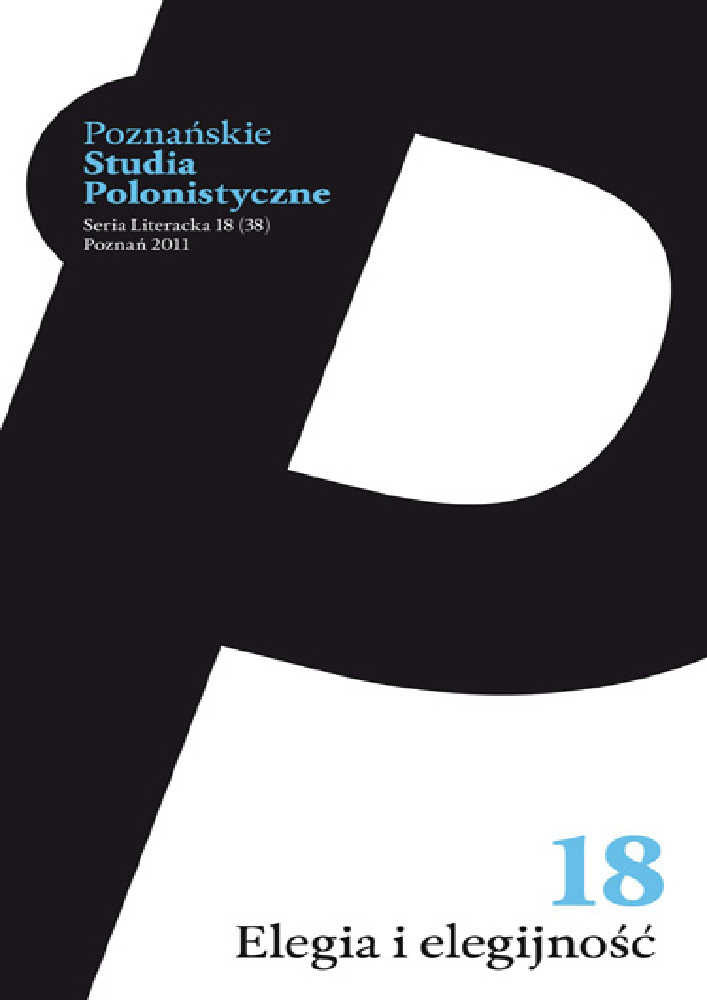Abstract
This article explores the relationships and correlations between early Greek elegy (7th—5th c. BC) and the elegiac mood of a poem understood today as a nostalgic and melancholic attitude of the subject evoked in a poem. The known surviving ancient texts prove the thematic heterogeneity of the elegiac genre at its early stage of development, while this elegiac emotionality is by no means a distinctive feature of this particular poetical category within the archaic parental context even though it does occur in some works composed in distichs that are traditionally labeled as elegiac (e.g. works of Archilochus and Mimnermus). Elegiac attitude, within modern understanding of the term, is also to be fund
in the melic poetry of early Greek poets (such as Sappho, Anacreon and Simonides of Ceos) which were, in fact, considered by ancient theoreticians as non elegiac as far as their genre was concerned. The attribution of the elegiac character, not linked genetically with any of genres, to one poetical category is thus a result of multilayered processes of cultural interaction and the reception of the early Greek literature rather than the substance of the genre.
References
Atenajos. Uczta mędrców, przełożyli, wstępem i komentarzem opatrzyli K. Bartol, J. Danielewicz, Poznań 2010.
Bartol K., Elegia okresu archaicznego, w: Literatura Grecji starożytnej, red. H. Podbielski, t. 1, Lublin 2005, s. 325–327.
Bartol K., Greek Elegy and Iambus. Studies in Ancient Literary Sources, Poznań 1993.
Bartol K., Liryka grecka. Wybór tekstów i komentarz, red. J. Danielewicz, t. 1: Jamb i elegia, oprac. K. Bartol, Warszawa–Poznań 1999, s. 71–76.
Danielewicz J., Nowo odczytane teksty Safony i Archilocha, „Meander” 2005, nr 60, s. 135–142.
Feichtinger B., Elegy, w: The New Pauly, t. 2: Classical Tradition, Leiden 2007, szp. 154–159.
Gerber D.E., A Companion to the Greek Lyric Poets, Leiden 1997.
Iambi et elegi Graeci ante Alexandrum cantati, red. M.L. West, t. 1: Archilochus, Hipponax, Theognidea, Oxford 1971.
Iambi et elegi Graeci ante Alexandrum cantati, red. M.L. West, t. 2: Callinus, Mimnermus, Semonides, Tyrtaeus, minora, adespota, Oxford 1972.
Legeżyńska A., Gest pożegnania. Szkice o poetyckiej świadomości elegijno-ironicznej, Poznań 1999.
Liryka starożytnej Grecji, oprac. J. Danielewicz, Warszawa–Poznań 1996.
Page D.L., The Elegiacs and Euripides’ Andromache, w: Greek Poetry and Life, Oxford 1936, s. 206–230.
Poetae melici Graeci, red. D.L. Page, Oxford 1961.
Rusello N., Archiloco. Frammenti, Milano 1993.
Schmidt M., Didymi Chalcenteri grammatici Alexandrini fragmenta quae supersunt omnia, Leipzig 1854.
Szatyńska-Siemion A., Elegia i epigram. Kilka problemów terminologicznych, w: Elegia poprzez wieki, red. I. Lewandowski, Poznań 1995, s. 11–18.
Verdenius W.J., The Principles of Greek Literary Criticism, „Mnemosyne” 1983, nr 36, s. 49–51.
License
Authors
Authors of texts accepted for publication in „Poznańskie Studia Polonistyczne. Seria Literacka” are required to complete, sign and return to the editor's office the Agreement for granting a royalty-free license to works with a commitment to grant a CC sub-license.
Under the agreement, the authors of texts published in „Poznańskie Studia Polonistyczne. Seria Literacka” grant the Adam Mickiewicz University in Poznań a non-exclusive, royalty-free license and authorize the use of Attribution-NoDerivatives 4.0 International (CC BY-ND 4.0)Creative Commons sub-license.
The authors retain the right to continue the free disposal of the work.
Users
Interested Internet users are entitled to use works published in „Poznańskie Studia Polonistyczne. Seria Literacka” since 2016, for non-commercial purposes only, under the following conditions:
- attribution - obligation to provide, together with the distributed work, information about the authorship, title, source (link to the original work, DOI) and the license itself.
- no derivatives - the work must be preserved in its original form, without the author's consent it is not possible to distribute the modified work, such as translations, publications, etc.
Copyrights are reserved for all texts published before 2016.
Miscellaneous
Adam Mickiewicz University in Poznań retains the right to magazines as a whole (layout, graphic form, title, cover design, logo etc.).
